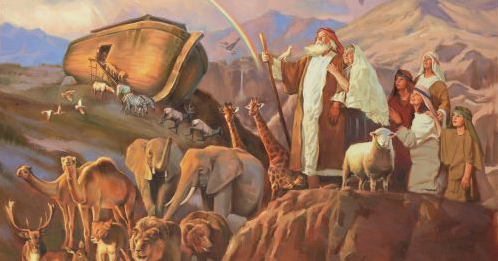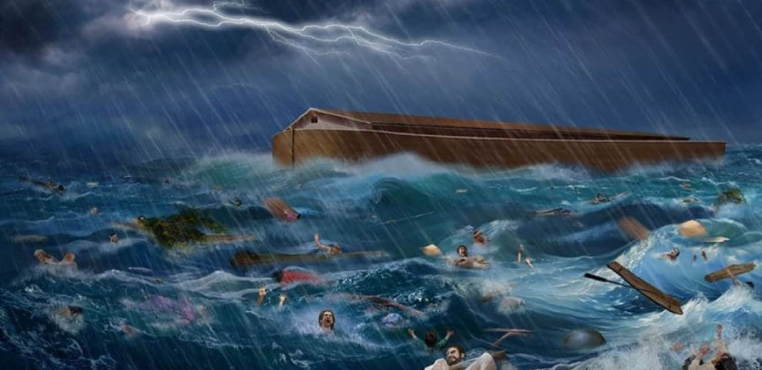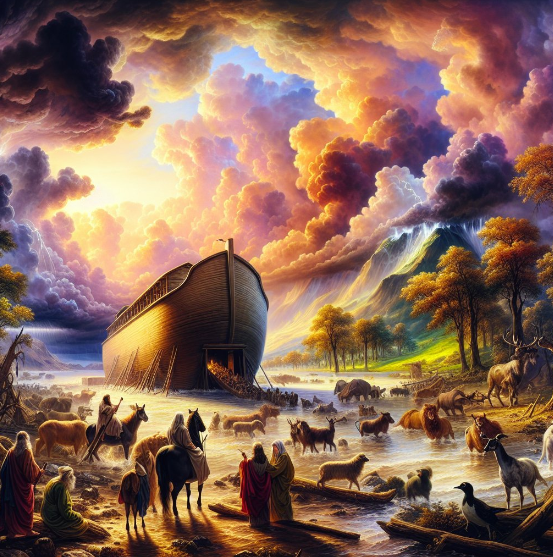NOAH, HIS FAMILY, AND THE ANIMALS ENTER THE ARK
Why was Noah righteous?
It was by faith, just as later on Abraham was counted righteous because of his faith: “And he believed in the LORD; and he counted it to him for righteousness” (Gen. 15:6).
Noah believed God, and it was counted to him for righteousness. “By faith Noah . . . prepared an ark . . .” the writer to the Hebrews said (Heb. 11:7).
That is the reason God saved him.
In chapter 6, God saw the wickedness and violence of humanity and resolved to wipe it all out. He revealed that plan to Noah, and He commanded Noah to build the ark.
In chapter 7, the ark is finished, the animals arrive, the door is shut, and the rain begins on a specific date in the history of the world. All life aboard the ark is saved; all land-dwelling, air-breathing life outside of it is ended.
The waters burst from below the earth and pour from above with great intensity for 40 days and then covered the earth for another 110. In the following chapter, the ark will come to rest, and the remade earth will begin to dry out.
Genesis 7:1-10 KJV
[1] And the LORD said unto Noah, Come thou and all thy house into the ark; for thee have I seen righteous before me in this generation.
[2] Of every clean beast thou shalt take to thee by sevens, the male and his female: and of beasts that are not clean by two, the male and his female.
[3] Of fowls also of the air by sevens, the male and the female; to keep seed alive upon the face of all the earth.
[4] For yet seven days, and I will cause it to rain upon the earth forty days and forty nights; and every living substance that I have made will I destroy from off the face of the earth.
[5] And Noah did according unto all that the LORD commanded him.
[6] And Noah was six hundred years old when the flood of waters was upon the earth.
[7] And Noah went in, and his sons, and his wife, and his sons’ wives with him, into the ark, because of the waters of the flood.
[8] Of clean beasts, and of beasts that are not clean, and of fowls, and of every thing that creepeth upon the earth,
[9] There went in two and two unto Noah into the ark, the male and the female, as God had commanded Noah.
[10] And it came to pass after seven days, that the waters of the flood were upon the earth.

Genesis 7:1
And the LORD said unto Noah, Come thou and all thy house into the ark; for thee have I seen righteous before me in this generation.
The Epistle to the Hebrews states that Noah prepared this Ark because he believed the Divine warning. The word “Come,” as used by the Lord, presents the fact that God is the first One in the Ark; had He been outside, He would have said, “Go into the Ark!”.
This also refers to Noah’s Faith in the coming Redeemer, for that is the only Faith that God will recognize. Paul wrote of him: “And became heir of the Righteousness which is by Faith” [Heb. 11:7].
The Faith addressed here speaks of Christ and what He would do at the Cross. Noah only had a dim view of that coming time, but, as dim as it was, he placed his past, his present, and his future in the Promise of God to send the “Seed”.
Have you ever noticed how gracious God is to this man in all of this time of judgment?
Here in verse 1 He says “Come thou. . . .” This is the same invitation that the Lord Jesus gives today to all mankind: “Come unto me, all ye that labour and are heavy laden, and I will you rest” (Matt. 11:28).
Then in verse 16 of this chapter, we read, “And the LORD shut him in.”
Isn’t that lovely?
And finally, chapter 8 opens, “And God remembered Noah.” How wonderful! God remembered Noah. God never forgets. He remembers you. The only thing that He does not remember is your sin if you have come to Him for salvation.
Your sins He remembers no more. What a beautiful thing this is!
Now Noah and his family enter into the ark.
Did you know that this story of Noah, just like the story of creation, has wandered over the face of the I wish that I could give you the Babylonian account?
All you have to do is to compare them to see the differences. The other accounts are utterly preposterous and ridiculous. The very fact that most nations and people have an account of both creation and the Flood should tell you something, my fellow Christian Siblings.
It ought to tell you that there is a basis of truth for them. All of these people would not come up with such a record if they had been making up stories. And if you want to know which one is accurate, just make a comparison.
The Babylonian account, for example, is a perfectly ridiculous story of a sort of war going on among the gods, one against the other, and that is what brought the Flood.
In contrast, the Bible tells us that the Flood was a judgment of God upon man for his sin—that makes sense, by the way.
A common theme of the book of Genesis is the fact that God “sees.” God observes what is true and acts on it. In Genesis 1, He saw what He had made was good. In the previous chapter, He saw all the wickedness which man’s sinfulness had made on the earth (Genesis 6:5).
Now God says He has seen Noah’s righteousness. Specifically, God has noticed the contrast between Noah’s choices and those of his generation. Throughout Scripture, God calls His people not to allow their peers, culture, or the moral standards of their times to set the direction of their lives.
Instead, He calls His people to be committed to obeying Him. Noah did that. The last verse of the prior chapter specifically says that Noah obeyed all that God told him, exactly as it was told him (Genesis 6:22).
Now that Noah has obeyed God by building the ark according to the Lord’s specifications, God commands Noah to take his family into the boat to be saved from the coming flood while the rest of his generation remains unprotected.

Genesis 7:2
Of every clean beast thou shalt take to thee by sevens, the male and his female: and of beasts that are not clean by two, the male and his female.
The extra six pairs of clean animals and birds would be used for sacrifice and food. All you have to do is turn over to see that when Noah got out of the ark, he offered clean beasts as sacrifices.
Where would he have gotten the clean beasts if he had not taken more than two?
It was only of the clean beasts that he took seven, and now we know why. Those that were not clean went in by twos, a male and a female. “Of fowls also of the air by sevens, the male and the female”—that is for those that are clean.
In the previous verse, God instructed Noah and his family to enter the ark. They are to take with them the animals, and here additional creatures are added. Specifically, they must bring seven pairs (male and female) of the clean animals and one pair each of the unclean animals.
The first readers of Genesis would likely have understood what was meant by clean and unclean animals, but this is the first hint in Scripture that God had designated some kinds of animals as clean and others as unclean.
Why seven pairs of the clean animals? After the flood, Noah will offer animal sacrifices to God (Genesis 8:20). Only clean animals are acceptable as a sacrifice, and Noah will need more than just one pair of those if each kind of animal is to survive as a species.
We know from Genesis 6:20 that the animals Noah was to take on the ark would have come to him; he didn’t have to go search for, select, and bring them back to the ark. However, Noah and his family were responsible to take them in with them.
These last-minute preparations would have taken time (Genesis 7:4), and according to this chapter, Noah and his family complete their work just in time (Genesis 7:13).

Genesis 7:3
Of fowls also of the air by sevens, the male and the female; to keep seed alive upon the face of all the earth.
This is not a reference to the Levitical Law, for that would not be given for another 900 years. Probably the clean animals mentioned were such as from the days of Adam and Abel, as had been offered in sacrifice.
Thus, provision was made for Noah’s sacrifice on his exit from the Ark, when the flood would subside. God could use them to replenish the earth.
In the previous verse, God instructed Noah to take the clean and unclean animals with him into the ark. This verse completes that instruction. Noah was also to take seven pairs each of all the kinds of the birds of the sky. This is an enormous number of animals.
God is clear about His intention, though. The point is to preserve life, to keep the offspring alive on the face of the earth. In the case of the birds, as we will see in the coming chapter, the flood would cover every surface that a bird might land on.
There would be no food or shelter for the birds during the flood. Without the ark, birds and all other land-dwelling life would cease to exist on the earth. God did not want that.
Why seven pairs of birds instead of just one pair? First, as the waters are receding after the flood, birds will be used as a test to see if any dry land is to be found in the area. If they did not return, that would be evidence that a habitat was reemerging (Genesis 8:7–12).
Second, birds would be offered along with other clean animals as a sacrifice to God after to the flood, meaning extra birds would be needed (Genesis 8:20).

Genesis 7:4
For yet seven days, and I will cause it to rain upon the earth forty days and forty nights; and every living substance that I have made will I destroy from off the face of the earth.
God allowed one more week for sinners to repent. The command to enter the Ark was given a week before the rains would begin — and rain such as the world had never known.
A worldwide rain for this length of time is impossible in post-Flood, atmospheric conditions, but not then. The canopy that covered the whole earth, a thermal water blanket encircling the earth, was to be condensed and dumped all over the globe.
In the prior verses, God instructed Noah to board the ark along with his family, and all the animals God intends to save. As one would expect, this took quite some time to complete.
God reveals His final deadline for the flood to Noah: seven days. In seven days from this moment, the rain would start. It would continue for 40 days and 40 nights, a deluge that would end all life “from the face of the ground.”
Noah had one week to get everything inside the ark which would be needed during the coming wrath of God. Everything left outside, including the rest of the human race, would be utterly destroyed.
According to verse 13, they are able to complete this task in exactly the amount of time they have left.
The word used for “earth” here is from the Hebrew root ‘erets. Some Bible scholars interpret this account as a local flood—one covering the territory of men, but not necessarily the entire globe.
Terms such as this are part of that discussion. There are other Hebrew terms used to explicitly describe the entire planet, such as tebel, but these are not used in the flood accounts.
Regardless of a local or global interpretation, what’s clear is both the intent and the effect of this catastrophe: the complete elimination of the human race, except for Noah and his family.
Genesis 7:5
And Noah did according unto all that the LORD commanded him.
This is the second time that the Holy Spirit through Moses speaks of Noah’s obedience.
Again in this verse, we are told very simply that Noah did all that the Lord commanded. Faithful Noah obeyed God. Period. That was his lifestyle.
His obedience is all the more remarkable to us because of the strangeness of the commands God gave to him: building a massive ark, preparing it to carry representatives of all of the animals of the earth, and then receiving those animals, including birds and insects, as they came to the ship in the week before the rain fell.
Noah’s prompt obedience was key to his survival: according to verse 13, the preparations were completed just as the waters arrived. Had Noah waited, there would not have been enough time to prepare.
It’s not surprising to us that the New Testament writer of Hebrews describes Noah this way: “By faith Noah, being warned by God concerning events as yet unseen, in reverent fear constructed an ark for the saving of his household.
By this he condemned the world and became an heir of the righteousness that comes by faith” (Hebrews 11:7). Noah acted in faith. His righteous obedience was evidence of that faith.
Genesis 7:6
And Noah was six hundred years old when the flood of waters was upon the earth.
This Verse proves that the 120 years of Genesis 6:3 had nothing to do with the time limit until the flood. In fact, the Bible doesn’t tell us how long it was that the warning was given to the people.
The number six is generally a Scriptural symbol of suffering. In the Apocalypse, the sixth seal, the sixth trumpet, and the sixth vial introduce critical periods of affliction.
In Genesis 5:32, we were told that Noah was 500 years old when he fathered his three sons. Then in chapter 6, God told Noah to build the ark. Now we learn that Noah was 600 when the flood came.
That suggests that Noah might have had as long as a hundred years to build the ark and prepare for the flood, though some scholars suggest that God’s revelation to Noah came much closer to the flood itself.
In any case, God certainly knew how much time it would take Noah to complete his work, and that this work would be completed just in time (Genesis 7:13).
While the idea of a 500-year-old man building a box the size of an apartment building seems outlandish, the context of the story is crucial. In this era, during the time from the Garden of Eden to the Flood, people had been living to be nearly 1,000 years old.
A man of 600 would be in his active years, the equivalent of middle-age. Human lifespans will begin to decrease dramatically after the flood (Genesis 6:3), but for now, Noah is not an “old man” in this context.
And, with so much time to work, and at least his sons to help, there’s no reason to think he could not have completed the task he was assigned.

Genesis 7:7
And Noah went in, and his sons, and his wife, and his sons’ wives with him, into the ark, because of the waters of the flood.
Concerning this time, Paul said in Hebrews 11:7 that they did this thing “being moved with fear and impelled by faith”.
Only eight people will survive the flood, which will otherwise wipe out all of humanity. Noah and his wife and their three sons and their wives would shortly become the only people left on the entire planet.
This is a common point held between those who interpret these verses as a local flood, and those who see a global flood. Whether these waters covered the entire surface of the globe, or only the regions inhabited by man, the purpose and effect is the same.
In the prior chapter, God saw that the human race was spiraling out of control. Everything was poisoned by evil (Genesis 6:5), and everything man did was abusive and vile (Genesis 6:11–12). The only exception, it seems, was Noah (Genesis 6:9).
Rather than allow mankind to fall into complete ruin, God chooses to judge evil. And, in doing so, to spare those who honor Him. In this way, the human race can survive, but his drastic turn towards evil can be stopped.
Noah’s three sons, Shem, Ham, and Japheth were each around 100 years old at this time, still relatively young men by the lifespans of their era.
Genesis 7:8
Of clean beasts, and of beasts that are not clean, and of fowls, and of every thing that creepeth upon the earth,
Seven couple of the one, and a couple of the other. Clean and unclean, also a like number. And upon that only, not in the water, for these had no need of the ark, they could live in the waters.
Verses 8 and 9 describe pairs of animals, insects, and birds entering the ark. Previous verses revealed that additional clean animals were included, for a total of seven pairs (Genesis 7:2).
Some of these would be sacrificed after the flood as an offering to God. God’s intent in the flood is to destroy the entire human race (Genesis 6:17), in judgment of their outrageous sin (Genesis 6:11–12).
Preserving the animals is God’s way of maintaining those creatures after the flood (Genesis 7:3).
Earlier verses indicated these animals were sent to the ark by God (Genesis 6:20). Noah was not scrambling around trying to catch unwilling creatures.
At the same time, from the moment God tells Noah to board the ark, to the point these preparations are complete, a full week has passed. And not a moment too soon, since the flood occurs on the very same day they finally enter the ark (Genesis 7:13).
Genesis 7:9
There went in two and two unto Noah into the ark, the male and the female, as God had commanded Noah.
Nothing short of Divine power could have effected such a timely and orderly entrance of the creatures into this huge vessel. Nowhere does Scripture say that Noah went out and drove the animals in. It was not necessary—they came to him.
Verses 8 and 9 explain that what God has commanded to Noah, Noah does (Genesis 6:22; Genesis 7:5). This is a distinguishing aspect of Noah’s character: his willingness to obey God (Genesis 6:9, 22).
And, what God has told Noah will happen has happened. Genesis 6:20 indicated that God would send pairs of animals to Noah, in order to keep their species alive after the flood.
After a week of last-minute preparation (Genesis 7:13), pairs of animals, both clean and unclean, along with the birds and insects (“creeping things”), entered the ark with Noah and his family. God’s plan was under way.
Life would be preserved in the midst of the destruction to come.
Humanity, on the other hand, was doomed, other than Noah and his wife, and his sons and their wives (Genesis 7:7). The following verse is the fulfillment of God’s dire prediction: a massive flood of water to purge earth of mankind’s horrific sin (Genesis 6:5; 11–12).

Genesis 7:10
And it came to pass after seven days, that the waters of the flood were upon the earth.
That which Noah had preached for a number of years was now a reality.
Finally, the flood begins. It comes at exactly the time God said it would in verse 4. God’s destruction of life on the earth, and the salvation of life from that destruction, has begun.
Here, as in prior verses, the flood is said to come on “the earth,” using the Hebrew term ‘erets. This term is often used in a local or regional sense.
The Bible uses a different Hebrew word, tebel, when specifically referring to the entire planet. This, along with a few other aspects of the language used, leads some Bible scholars to interpret this as a local flood.
In other words, an event covering the regions inhabited by mankind, but not necessarily the entire planet.
Since the intent is the destruction of sinful man (Genesis 6:5), this ultimately makes little difference as far as the story of the flood itself is concerned. God judges mankind with the flood, and only Noah and his family survive (Genesis 6:18).
It’s interesting to notice that God continues to operate within the seven-day cycle He established when He created the earth. Noah will adhere to a seven-day cycle when sending out the birds to look for dry land in chapter 8.
Israel, too, will conform to God’s seven-day cycle when the nation is established later in the book of Genesis.
I hope that you have really enjoyed this post,
Please Leave All Comments in the Comment Box Below ↓













The story of the Ark has been the subject of extensive explanation in various Abrahamic traditions, with theoretical and practical solutions (such as how Noah dealt with animal waste) mixed with allegorical interpretations (eg the Ark as the forerunner of the church offers salvation to humanity).
In fact, the story of the Flood is one of the most common themes in mythology around the world, which both skeptics and believers use as evidence in support of their position.
Hello,
Noah could not perish because the Ark could not perish; the Ark could not perish because Jehovah was in the Ark; in effect, the Ark was Christ; therefore, God was in Christ, reconciling man unto Himself.
Thank you for your comment,
Jerry
Thank you for sharing this detailed explanation of the story of Noah and the ark.
It’s evident that you have put a lot of thought and research into your comment. The story of Noah’s righteousness and his obedience to God’s commands is indeed an important aspect of the biblical narrative.
It’s fascinating to see the parallels drawn between Noah’s faith and righteousness and that of Abraham, as both were counted as righteous because of their faith in God.
Noah’s faith in God’s warning about the impending flood and his commitment to building the ark as instructed is a testament to his trust and obedience.
Hello again Anoth,
Thank you for continuing to take opportunites to comment on HBS & DwJ Podcast episodes, that are obtained from the HBS & DwJ website.
Glad to hear that you find it fascinating to see the parallels drawn between Noah’s faith and righteousness, as well as that of Abraham. I totally agree with your conclusion on these episodes, and your opinion on these topics are very much appreciated.
Blessings My Friend!
Hello, thanks for your insight on Noah’s life!
Noah was faithful because he obeyed God’s commandments and had a clean lifestyle, among many people who didn’t. They all lived a strange lifestyle like antediluvian giants – you know the children born out of women and fallen angels.
You need to read the Book of Jubilees because it will complement what you read and study in Genesis…
Hello angelce903,
Thank you for sharing your interest in Entering The Ark – The Flood Begins Destruction.
It is my pleasure to share this information with you. I have information about the antediluvian giants – the children born out of women and fallen angels you speak of in The Wickedness Of The World – The Righteousness Of Noah (G-6-HBS).
Feel free to check it out. Thank you for the Book of Jubilees reference.
You are most certainly welcome for my insight on Noah’s life.
Blessings My Friend!
The article recounts the story of Noah and the Great Flood from the book of Genesis in the Bible.
It highlights Noah’s righteousness and faith, which led God to choose him to build the ark and save his family and pairs of animals from the impending flood that would wipe out the rest of humanity.
The story emphasizes Noah’s obedience to God’s commands, illustrating his promptness in completing the ark’s construction and gathering the animals before the flood began. It also mentions the distinction between clean and unclean animals, with seven pairs of clean animals being taken into the ark, indicating that some would be used for sacrifices after the flood.
The flood itself is portrayed as a judgment from God upon the wickedness and violence of humanity. While some interpretations suggest that the flood may have been a local event, the primary focus is on God’s judgment and the preservation of life through Noah and the ark.
The article also mentions how Noah’s story and the account of the flood have similarities with other cultural accounts, but the biblical narrative stands out as one of judgment for human sin rather than a mere conflict among gods.
Overall, the article retells the biblical story of Noah and the flood, highlighting Noah’s faith, obedience, and the significance of God’s judgment and mercy in the preservation of life.
Well written, and I have thoroughly enjoyed reading it.
Have a blessed day!
Hello again skamalka,
Thanks for stopping by the HBS & DwJ website, turned podcast to comment on another episode.
I totally agree with your conclusion and opinion on this episode, they are very much appreciated. It pleases me to learn that you have thoroughly enjoyed reading the information contained in this website, as well as, your opinion about it being well written.
You have a Blessed Day as well,
Blessing My Friend!
I like this a lot.
Your coverage of the bible is really top-notch. You categorized everything well and you didn’t really overdo it. I enjoyed reading the verses you had on your homepage, you made sure every category was informative, factual, and neatly written, the punctuation was great and your attention to detail and design will generate a great audience for you.
Best of luck on your journey!
Hello Brante’ Boutte,
Welcome to the HBS & DwJ website turned Podcast episode platform.
There are a lot of changes that must be made, and challenges that must be overcome for growth to begin to take place in order to become any type of example as believers in GOD.
Thank you for reading, commenting, for considering this a really top-notch article, and for considering this an informative, factual, and neatly written informational website.
Thank you for your adoration concearning this information, and thanks again for commenting.
Blessings My Friend!